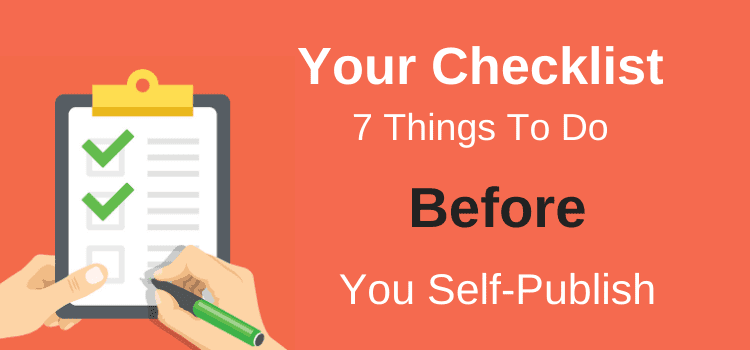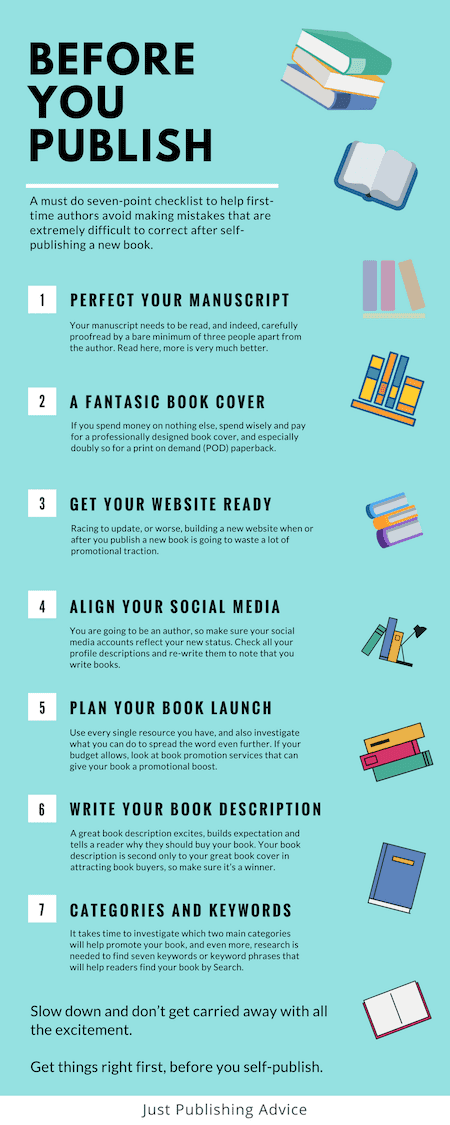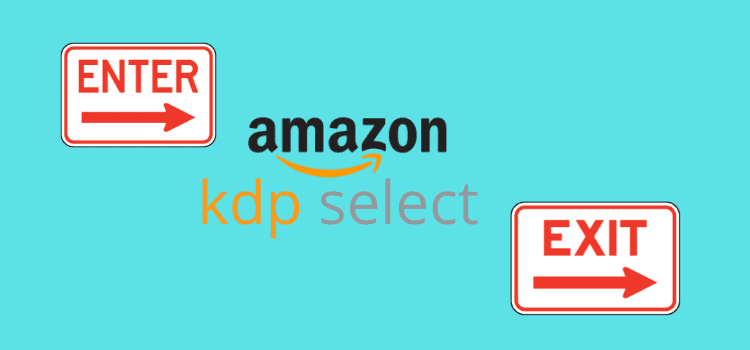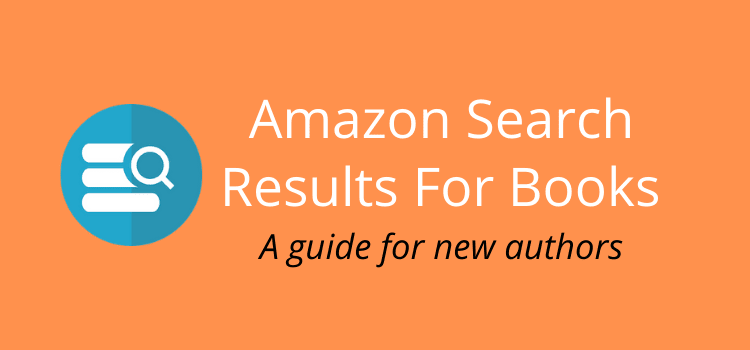
Before you self-publish a book, make sure you have everything in place and ready.
Too often, new authors get carried away with the excitement of becoming published authors and rush way too fast into publishing.
For a new Indie author, it is all too easy to upload your book. Then, within twenty-four hours, you have your new digital ebook available for sale on ebook retailers.
But without creating the necessary marketing and promotional tools before publishing a book, it then becomes a never-ending game of catch-up.
Rushing to self-publish a book
What should have been an exciting book launch ends up being a disappointment.
It is because very few people, apart from the author and friends and family, knew about the new book release.
Uploading a Word file and a cover image to Kindle Direct Publishing for ebook and print-on-demand is extremely easy.
But you need to do the necessary work before hitting the publish button for your book on Amazon.
If not, it is like throwing a message in a bottle into the ocean.
You will then hope that someone will find the note inside, obey, and buy a copy of your book.
It is not a recipe for success.
The far better way to successfully self-publish your book is to get the basics in place first.
In fact, there are now many free tools for new authors to make the process easier.
You should do this well before you start the process of publishing your book.
How to self-publish a book in seven steps
Here is a seven-point self-publishing checklist to help first-time authors of nonfiction and fiction books avoid making classic mistakes.
These elements are extremely difficult to correct after you self-publish your new book.
1. Make sure your manuscript is perfect

All too often, inexperienced authors believe that close enough is good enough. Some think that a quick read and a run through the Microsoft Word spell checker is the end of the process. Far from it, and it is the most common cause of a book failing to sell.
Getting a manuscript ready for publishing takes much more work. It is because the author rarely spots errors, typos, and especially inconsistencies.
However, the cost of a book editor and professional proofreading is often beyond the budget of a new author. But that doesn’t mean that it is a reason to be careless with your manuscript. Manuscript preparation is a slow step-by-step process.
You can use a premium writing checker, but it’s not going to catch every error.
Your manuscript needs to be read. And indeed, carefully proofread by a bare minimum of three people apart from the author. Read here; more is very much better.
Ask friends, relatives, and social media contacts, or even reach out to proofreaders who offer their services online. Many of these are quite affordable.
You should also try to find as many beta readers as you possibly can. With the feedback and noted corrections, you can gradually improve your manuscript to an acceptable standard for publication.
This will avoid the mistake of rushing to publish a book that is full of grammatical errors, spelling mistakes, and typos.
The next step is to format your book ready for publishing in an ebook or paperback.
A poor manuscript is a sure recipe for terrible reviews and few sales. Take the time to get it right before you take another step in the publishing process.
Time to allow: 3 months
2. Do not (read here never, ever) create your own book cover

Any article I read about self-publishing mentions getting a quality book cover designer on the job.
Don’t even think about designing your cover yourself unless you are an expert in Photoshop and graphic design. Get a book designer.
A poor, low-resolution homemade book cover will be an instant sales turn-off to a potential reader. This is especially so for print books.
You have to think about the fonts and colors for your book cover. Do they match the genre of your story?
If you spend money on nothing else, spend wisely and pay for a professionally designed book cover.
It goes doubly, so if you plan to publish a print version with Blurb, Lulu, or KDP print on demand.
Your cover will be the first thing potential buyers see, so you need to make it instantly attractive to readers of your book genre.
Time to allow: 1 month
3. Get your website ready BEFORE you publish

Never race to update or, worse, build a new website after you publish. It will waste a lot of your time and promotional traction.
It is vital that you have your website up and running well before you publish your book. Then, you can use it to promote your forthcoming release.
In particular, is your website responsive and able to be viewed correctly on phones and tablets?
The same applies to a blog. Even though it may be years old, get your blog updated and refreshed.
Write new articles or a blog post about the new release of your latest book well in advance. Build some pre-sales hype.
Planning to offer your new Kindle title on pre-order is always a very, very good idea. Use your blog and website as promotion tools to help in getting some pre-orders.
If you can get some pre-order sales, they will really help give your launch day a huge boost and result in a much better first-day sales ranking.
A good sales ranking sells books, so don’t miss this opportunity to have it ranking well from day one.
Time to allow: 3 months

You are going to be an author, so make sure your social media accounts reflect your new status.
This might mean starting new accounts or, at the very least, modifying your existing accounts.
Check your usernames and decide if they reflect what you do. If not, change your username, or create new accounts.
Also, check all your profile descriptions and re-write them to note that you are an author who writes books.
Social media now plays a huge part in any promotion.
Make sure your accounts are fine-tuned and ready to inform the world about you and your new title.
Do this well before you publish your book.
Time to allow: 2 months
5. Get your launch plan ready

How will you market your title? Do you have a book launch plan? Will you offer your book for free?
How will you promote it in the longer term? Is your new book priced competitively?
You need to consider every possible promotion method before, during, and after the launch.
Make a list of what you plan to do. Then, when you plan to do it, and how you plan to do it.
Make plans for your website, new blog articles, social media posts, and local newspapers.
Always ask friends and family if they will help your promotion on their social media accounts.
At the very least, ask them to Like your Facebook Page, share your posts, and retweet your tweets.
Use every resource you have and investigate how you can spread the word even further.
There are always some costs to self-publish.
If your budget allows, look at book promotion services that can give your book a promotional boost.
Time to allow: 2 months
6. Write your book description.

All authors hate this task. So don’t think you can do it at the last minute.
A good book description will take hours, days, or even weeks to get right.
Ideally, it should be around 600 words and written to hook a potential book buyer.
Don’t merely summarize your story.
An excellent description excites, builds expectations, and tells a reader why they should buy your book.
If you are struggling with ideas, think about using questions in your book description to attract reader interest.
Your book description is second only to your fantastic book cover in attracting book buyers. So make sure it’s a winner.
Time to allow: 1 month
7. Research your Amazon categories and keywords

When you self-publish a book on any publishing service, you will need to select three categories (genres).
You will also need to choose a minimum of seven search keywords, which you must select for both your ebook and print versions.
Many new authors know nothing about categories and keywords. They don’t consider this until they are in the actual process of publishing.
At that stage, it is far, far too late. Most will click three random categories and add seven keywords without any thought whatsoever.
This is an absolutely fatal mistake.
More book sales by far are generated from categories and keywords than from any other form of book promotion.
You need to get these selections absolutely right for your book.
It takes time to investigate which categories will help promote your book.
When your book is published, you can add only three categories.
It will take you even more time to research and find your seven keywords or keyword phrases.
These will help readers find your book by using Amazon Search.
A vast majority of book sales result from book buyers searching Amazon, Apple, B&N, and other online retailers.
So, making your book discoverable by categories and keywords is vital to your chances of success.
It is important to understand that your book will be listed alongside books by major publishing companies, especially on Amazon.
But readers don’t differentiate. So make sure your chances of book discovery are just as good by using well-researched categories and keywords.
Take the time to research your categories and keywords well in advance of publishing.
You can save time and get much better results if you use dedicated software for this task.
Time to allow: 1 month
Conclusion
There are many elements and some costs involved in publishing a self-published book or ebook.
Self-publishing is no different from any other part of the publishing industry.
Poor books rarely sell well.
Many new authors get things wrong by rushing too fast.
Pushing the publish button is at the very end of the process and not at the beginning.
If you are publishing a paperback, make sure you get printed proof copies. It’s difficult to check the quality with online proofs.
Rushing to publish without having everything as perfect as you can beforehand usually results in disappointment.
It’s a fact that very few new books sell well, even for a traditional publisher.
To have a chance, you need to prepare, plan ahead, and execute every stage as best you possibly can before you self-publish a book.
If you have a manuscript ready and you are planning on self-publishing a new book, stop for a moment.
Go over the checklist of actions to take before you self-publish a book once more.
If you can’t tick every box, take the time to get everything right, which could take you up to three months.
But these three months could really make the difference between the success or failure of your new book.
Slow down, don’t get carried away with the excitement, and get things right first before you self-publish.
Bestselling books are never created and published in a few minutes.
Your self-publishing checklist

Related reading: How To Check An Ebook Before Publishing Your New Book




I’ve been wanting to write a book for a long time. I’ve had this story just dying to escape its imprisoned script within my brain an find it’s way to some paper. Writing has always just came natural to me in any from, poetry included. I look forward to this new an too long wasted talent that I hope the world will enjoy as much as i know i will enjoy sharing my story with you!
This was a lot of help! I’m a new author. I just finished a 12 chapter children’s book, had it copyrighted and looking into the next steps. There is so much information out there, so anytime I see something that has this kind of information for free, I take advantage of it. These are usually the sites where I will go to for advise, especially one like this, seems trustworthy.
thanks again!
In sequential order, how would this work if you have already done some proofreading with Grammarly (this entire comment has a Grammarly aid at its disposal)? Is there any additional advice for an author who has published once before? My first nonfiction book is entitled “Feeling Blue The American Republic,” and let me tell you, I was so excited that I didn’t plan as properly as I could have hoped for. Consequently, I wanted to publish effective immediately. Now, I want to market and promote the best that I can. I’m looking to self-actualize and above all grow my audience base to its utmost potential. I have so many stories and epiphanies of insight and wisdom to share with this world. Thank you very much for the helpful feedback!!!
I was just approved by Writers Connection and am beginning to learn about it. So far, I haven’t had much success with many of the sites that want to help you sell books, and shy away if they are asking for money to make me a “successful” author. I realize it would be better to hire an editor and a graphic designer, but alas the money for them is not in the cards. Several people have agreed to read my books and give me their opinion, but the actual reviews are few and far between, they will read for free, but taking pen in hand to write if they like it or not seems a stretch. But I keep writing because I must write, and can’t stop.
Thank you for this information. I have a client who I ghostwrote a book for this past year. We are in the editing stage and client decided to release as an ebook, at least at first. The timeline you’ve shared here and the steps and tips are helpful for us both. Thank you.
Thank you for your important and positive information.
Great advice now, I have some ideas I need to work on.
My manuscript is finished and I am ready to self publish.
I am feeling better about what to do before I hit the print button.
Grateful!
Flo Miller
Great information. Several I had given no thought to. But I have time. :-) Thanks!
I followed a link on Twitter, fyi, then continued reading your blog.
very helpful. Thanks for a time base.
David
Thank You for helping emerging authors. I like the tip about the time suggested to meet deadlines on every task. I opened a GoFundMe account with a $1,999 goal to fundraise this project, unsuccessful so far. I had my own donation of $5 dollars. Would you give me a hint about how to promote GoFundMe? or are the any other sources while one is unemployed. I also use social media Facebook, however they did not find too sexy, the purpose of my fundraising. Also, is WIX a great way to design a web site? Good day!
Try Kickstarter. I had to abandon GoFundMe because of those same issues-no action. Plus, it’s a 2-for-1 special, it’ll help to pre-push your project on social media.
I e-published my first book ‘The Hartnetts’ six months ago and it has sold reasonably well. I announced it in local papers and I had no idea about this being the case. The only thing that I don’t have at the moment is a website but I am contributing to a lot of blogs. I am also endeavouring to create one. Is there any way I can rectify this problem as I understand that it can make things awkward if you don’t?
The problem that I am having is that the computer I use does not have Internet access. However apart from that I have been using Twitter and Facebook a lot to promote it. Is there anything else that I could be doing?